
[ad_1]
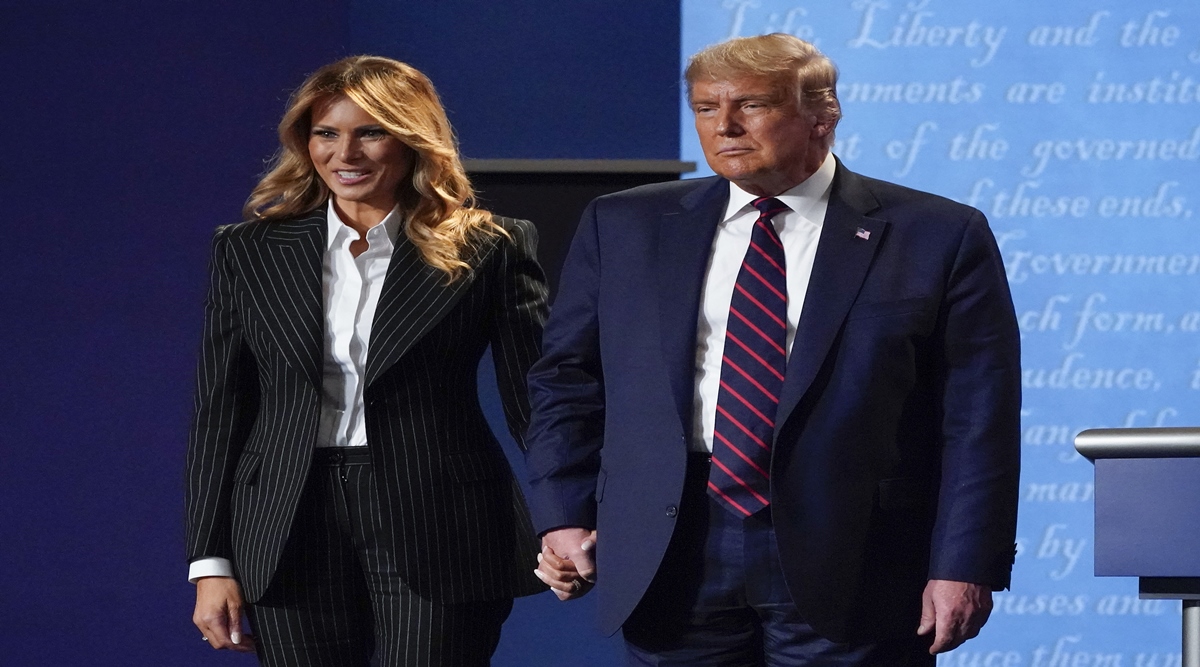 US President Donald Trump and first lady Melania Trump have both tested positive for COVID-19. (AP Photo/Julio Cortez, File)
US President Donald Trump and first lady Melania Trump have both tested positive for COVID-19. (AP Photo/Julio Cortez, File)
In the biggest news of the week, US President Donald Trump and First Lady Melania Trump tested positive for the coronavirus on October 2. Trump, whose administration has been accused by his opponents of an inadequate response to the pandemic, resulting in the death of over 200,000 Americans, contracted the virus from one of his closest aides ahead of the November 3 elections.
In the Middle East, Armenia and Azerbaijan are engaged in violent clashes over the separatist region of Nagorno-Karabakh, in their worst flare-up of the last two decades.
On the Brexit front, the European Union took legal action against Britain over its plans to pass legislation that would breach parts of the legally binding divorce agreement the two sides reached late last year.
This, and more news from across the world this week.
US & Canada
With just one month left for elections, US President Donald Trump and wife Melania tested positive for the coronavirus on October 2. One of his closest advisers, Hope Hicks, had been infected, bringing the virus into his inner circle. He was hospitalised the same day and had to cancel all his campaigns.
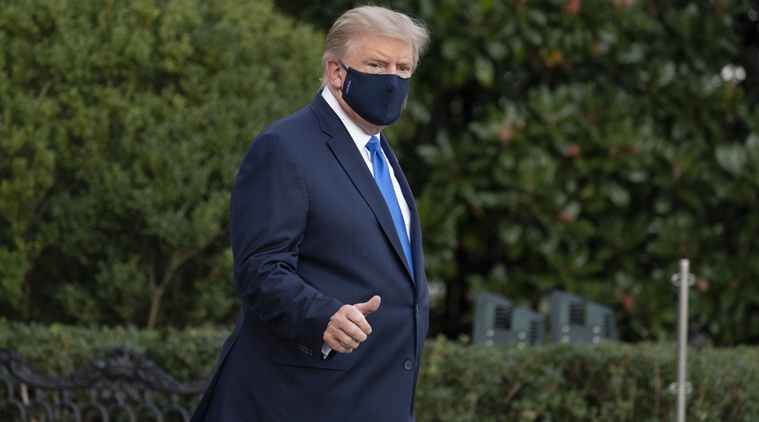 US President Donald Trump leaves the White House to go to Walter Reed National Military Medical Center after he tested positive for COVID-19, Friday, Oct. 2, 2020, in Washington. (AP)
US President Donald Trump leaves the White House to go to Walter Reed National Military Medical Center after he tested positive for COVID-19, Friday, Oct. 2, 2020, in Washington. (AP)
Also Read:
Trump tests Covid positive: What we know and don’t know
Explained: Who Donald Trump met in the weeks before he tested Covid-19 positive
Explained: What is the Covid-19 treatment plan for President Donald Trump?
Explained: What happens to election if Covid-19 puts President Donald Trump out of the contest
Trump, Biden face off in first presidential debate
On September 29, Donald Trump and his Democratic challenger Joe Biden locked horns in the first of three presidential debates ahead of polling day on November 7. The 90-minute debate saw tense clashes between both candidates on key subjects like the coronavirus pandemic, race tensions, climate change and the economy.
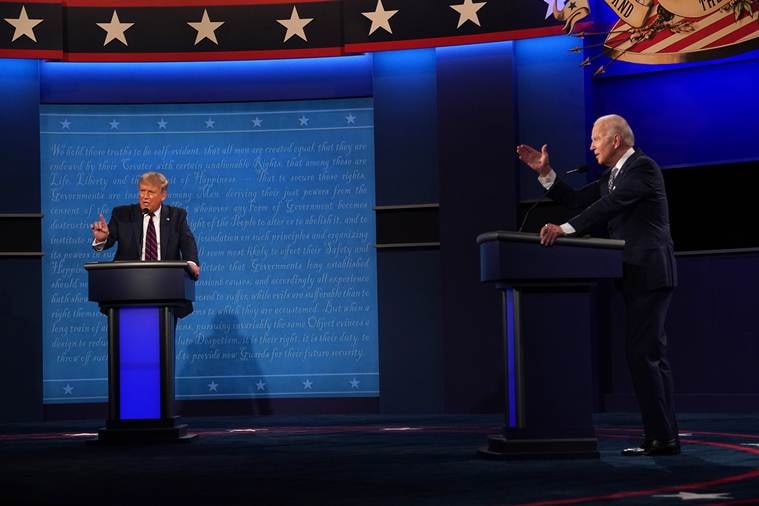 Donald Trump and Joe Biden, the Democratic nominee, on Tuesday, Sept. 29, 2020 at the first presidential debate in Cleveland. (Doug Mills/The New York Times)
Donald Trump and Joe Biden, the Democratic nominee, on Tuesday, Sept. 29, 2020 at the first presidential debate in Cleveland. (Doug Mills/The New York Times)
A Kentucky grand juror involved in the decision not to bring murder charges against police officers who killed Breonna Taylor, a 26-year-old Black woman, in her apartment, asked that the transcripts and recordings of the secret proceeding be made public so that “the truth may prevail”.
Canada reintroduces Bill banning LGBT conversion therapy
On October 1, Canada reintroduced a Bill seeking to criminalise LGBT conversion therapy, a federal minister said after an earlier effort to ban the practice failed as the parliament was discontinued due to the coronavirus pandemic, Reuters reported.
Middle East
Armenia Azerbaijan conflict
On September 27, fighting broke out between Armenia and Azerbaijan around the separatist region of Nagorno-Karabakh and the Armenian Defense Ministry said two Azerbaijani helicopters were shot down.
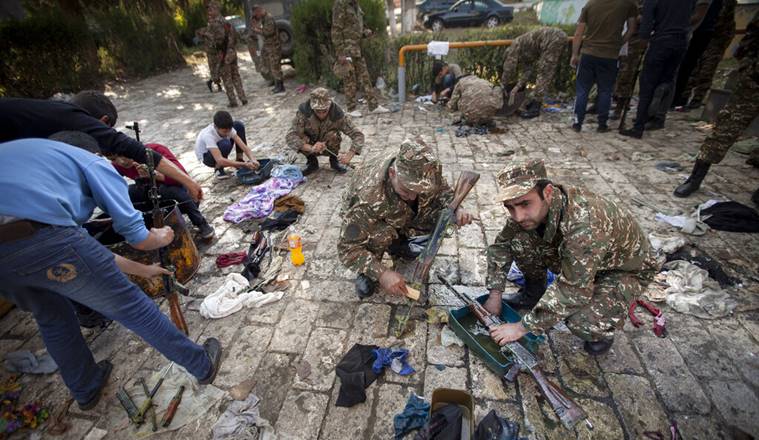 Armenia Azerbaijan conflict: Volunteers help soldiers clean guns near Hadrut, self-proclaimed Republic of Nagorno-Karabakh, Azerbaijan, Tuesday, Sept. 29, 2020. (AP Photo/Karen Mirzoyan)
Armenia Azerbaijan conflict: Volunteers help soldiers clean guns near Hadrut, self-proclaimed Republic of Nagorno-Karabakh, Azerbaijan, Tuesday, Sept. 29, 2020. (AP Photo/Karen Mirzoyan)
A spokesman for Nagorno-Karabakh’s president claimed on Facebook that intelligence data showed some 3,000 Azerbaijanis have died in the fighting. Armenian Defence Ministry spokesman Artsrun Ovannisian said later that 2,300 Azerbaijan troops were killed. On October 4, Azerbaijani officials said Armenian forces attacked Ganja, the country’s second largest city.
While the US, France and Russia jointly condemned the fighting in Nagorno-Karabakh and called for ceasefire, Turkey — an ally of Azerbaijan — dismissed demands for a ceasefire.
Also Read | Azerbaijan vs Armenia: An old regional conflict, interested neighbours
Tens of thousands of Israelis demonstrated in hundreds of locations across the country against Prime Minister Benjamin Netanyahu, pressing ahead with their campaign as the government banned large, centralised demonstrations as part of a new coronavirus lockdown.
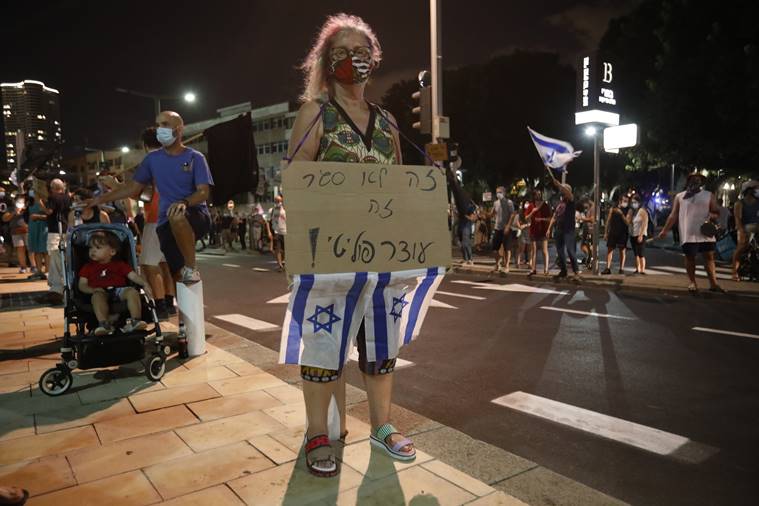 An Israeli protester holds a banner saying “it not a lockdown its a political curfew” during a demonstration at Tel Aviv on Saturday, Oct. 3. (AP Photo/Ariel Schalit)
An Israeli protester holds a banner saying “it not a lockdown its a political curfew” during a demonstration at Tel Aviv on Saturday, Oct. 3. (AP Photo/Ariel Schalit)
Kuwait ruler Sheikh Sabah dies
Kuwait’s Crown Prince Sheikh Nawaf Al Ahmad Al Sabah became the oil-rich nation’s new ruling emir on Tuesday night, reaching the highest post in the country after decades in its security services. He ascended to the throne after his predecessor, Sheikh Sabah Al Ahmad Al Sabah, died on September 29 aged 91.
Sheikh Nawaf, 83, had served as the crown prince since 2006, jumping a traditional order of alternating rule between the Al Jaber and the Al Salim branches of the country’s ruling family.
Also Read | Pilgrims return to Mecca as Saudi eases virus restrictions
Europe
The European Union took legal action against Britain on October 1 over its plans to pass legislation that would breach parts of the legally binding divorce agreement the two sides reached late last year.
Both sides are trying to forge a rudimentary free trade agreement before the end of the year, but the fight over the controversial UK Internal Market bill has soured relations this month.
President Alexander Lukashenko of Belarus was sworn in to his sixth term in office at an inaugural ceremony that was not announced in advance amid weeks of huge protests against the authoritarian leader’s reelection, which the opposition says was rigged.
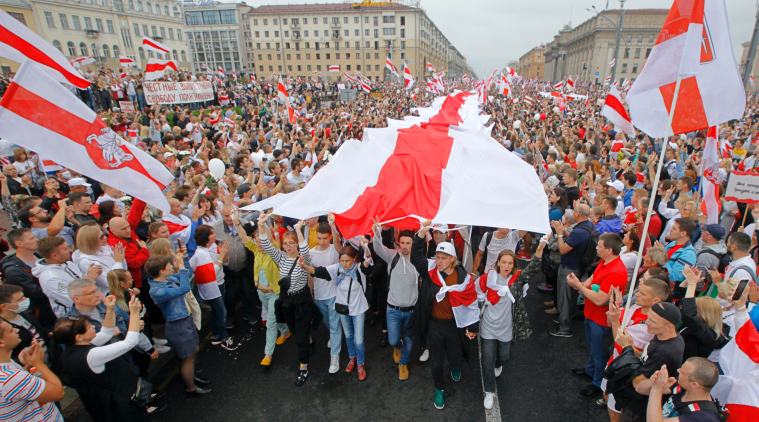 Demonstrators taking to the streets of the Belarusian capital and other cities. (AP Photo/Dmitri Lovetsky)
Demonstrators taking to the streets of the Belarusian capital and other cities. (AP Photo/Dmitri Lovetsky)
On October 2, European Union leaders agreed to impose sanctions on dozens of senior officials in Belarus accused of falsifying presidential election results and leading a crackdown on peaceful protesters.
France’s Macron details plan targeting Islamist ‘separatism’
President Emmanuel Macron, trying to rid France of what authorities say is a “parallel society” of radical Muslims thriving outside the values of the nation, is laying the groundwork for a proposed law aimed at helping remedy the phenomenon.
Meanwhile, a Pakistani man, accused in a double stabbing outside the former Paris offices of satirical newspaper Charlie Hebdo, has been given preliminary terrorism charges.
Over five million Swiss voters cast ballots September 27 and rejected a proposal to limit the free movement of people and immigration from the European Union.
The referendum was initiated by the ruling right-wing Swiss People’s Party (SVP), which claims that the existing pact, that allows 75,000 EU citizens to enter the country each year, has caused significant strain on the welfare system and has led to overpopulation.
Russian opposition leader Alexei Navalny, who was recovering in Germany after being poisoned in Russia by a nerve agent, accused Kremlin President Vladimir Putin of being behind the attack in comments released September 30.
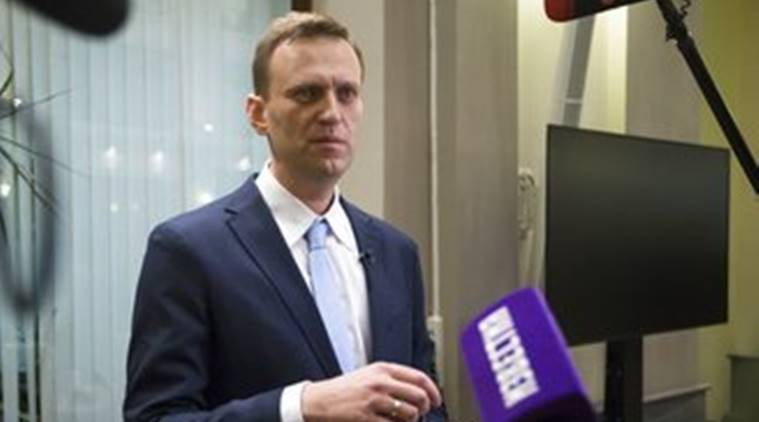 Russian opposition leader Alexei Navalny. (AP Photo/Ivan Sekretarev)
Russian opposition leader Alexei Navalny. (AP Photo/Ivan Sekretarev)
He told Germany’s Der Spiegel magazine that in his mind, “Putin was behind the attack”, in a German translation of his comments.
Asia
Afghan peace official sees little change in US policy regardless of election result
Afghanistan’s top peace official, Abdullah Abdullah, said on September 30 he did not expect the result of the upcoming US presidential election to dramatically change the Afghan peace process or troop withdrawal plans, Reuters reported.
The United States is pulling out its troops under a deal with the Taliban signed in February. The withdrawal is expected to be complete in May, subject to certain security guarantees.
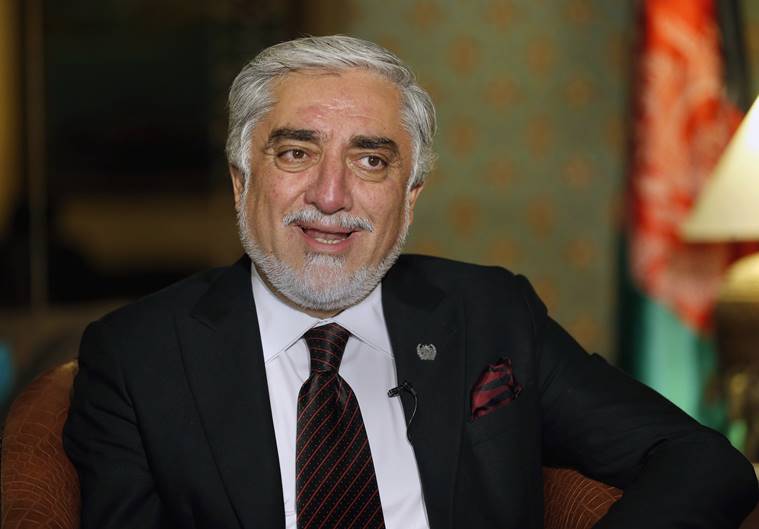 Abdullah Abdullah, chairman of Afghanistan’s High Council for National Reconciliation, speaks during an interview with The Associated Press, in Islamabad, Pakistan, Wednesday, Sept. 30, 2020. (AP Photo/Anjum Naveed)
Abdullah Abdullah, chairman of Afghanistan’s High Council for National Reconciliation, speaks during an interview with The Associated Press, in Islamabad, Pakistan, Wednesday, Sept. 30, 2020. (AP Photo/Anjum Naveed)
Philippines’ President Rodrigo Duterte questioned why he should allow Facebook to continue operating in the Philippines after the social media giant removed accounts he said backed his government’s interests, including fighting insurgents.
Facebook had removed a Philippine network of fake accounts whose operators tried to conceal their identities and used “coordinated inauthentic behaviour” to mislead people.
Japan military seeks record budget of $55 bn amid regional threats from China, N Korea
Japan’s Defence Ministry is seeking a record-high budget of nearly 5.5 trillion yen ($55 billion) for fiscal 2021 to fund more purchases of costly American stealth fighters and expand its capability to counter possible threats in both cyber and outer space. The budget request made public on September 30 is the first under new Prime Minister Yoshihide Suga and would be an 8% increase from the current year.
China accuses US of trying to take world back to ‘jungle age’
China accused the United States of “fabricating lies” and trying to take the world back to the “jungle age” after Washington blamed Beijing and UN agencies for “the murder of millions of baby girls”, Reuters reported.
The United Nations Population Fund (UNFPA) on Friday said it regretted the accusations by US Education Secretary Betsy DeVos, which were made at a UN General Assembly meeting on Thursday on the anniversary of a landmark 1995 women’s conference.
Hong Kong police arrest dozens
Hong Kong riot police patrolling the route of a banned anti-government march arrested dozens of people on October 1, stopping crowds from gathering as Chief Executive Carrie Lam hailed the city’s “return to stability” at China national day celebrations, Reuters reported.
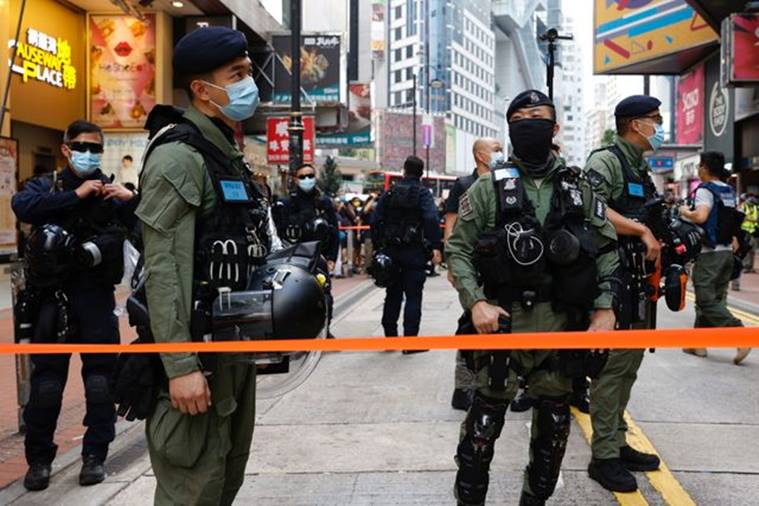 Police stand guard to avoid mass a gathering on Chinese National Day in Hong Kong, China October 1, 2020. (REUTERS/Tyrone Siu)
Police stand guard to avoid mass a gathering on Chinese National Day in Hong Kong, China October 1, 2020. (REUTERS/Tyrone Siu)
South and Central America
Fires in Brazil’s Amazon the worst in a decade, data shows
Fires in Brazil’s Amazon increased 13% in the first nine months of the year compared with a year ago, Reuters said, reporting on data from space research agency Inpe on October 1.
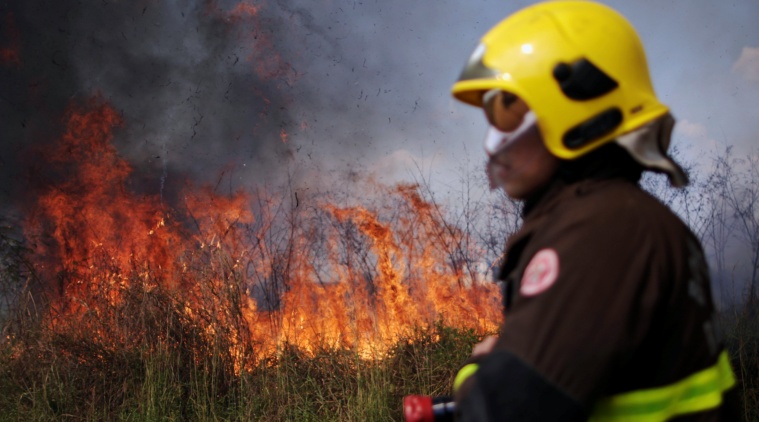 A firefighter monitors a spot fire in an area of the Amazon rainforest, near Porto Velho, Rondonia State, Brazil. (REUTERS/Ueslei Marcelino)
A firefighter monitors a spot fire in an area of the Amazon rainforest, near Porto Velho, Rondonia State, Brazil. (REUTERS/Ueslei Marcelino)
The Amazon is experiencing a more severe dry season than last year, which scientists attribute in part to warming in the tropical North Atlantic Ocean pulling moisture away from South America.
Jair Bolsonaro slams Joe Biden for ‘coward threats’ over Amazon
Brazilian President Jair Bolsonaro reacted angrily to US Democratic presidential candidate Joe Biden’s call for a world effort to offer Brazil $20 billion to end Amazon deforestation or face unspecified “economic consequences.”
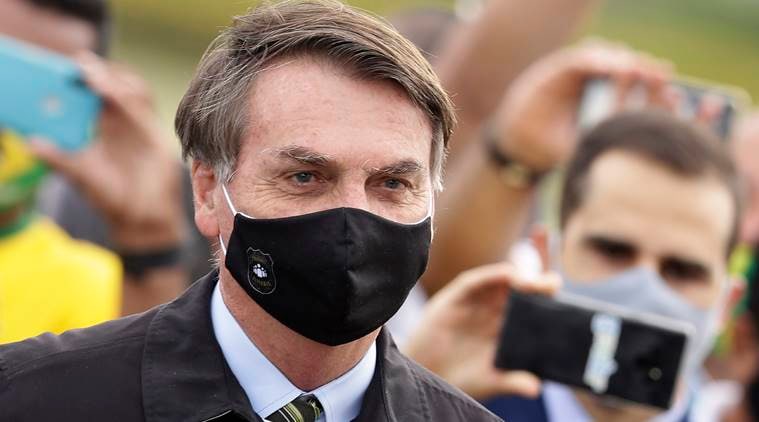 Brazil’s President Jair Bolsonaro (AP Photo/Eraldo Peres, File)
Brazil’s President Jair Bolsonaro (AP Photo/Eraldo Peres, File)
Infuriated, Bolsonaro wrote on Facebook he interpreted Biden’s comment as a threat of economic sanctions if Brazil did not take the offer.
Oceania
Australia to open ‘travel zone’ to New Zealanders
In a first since the imposition of coronavirus-induced restrictions, Australia has decided to open borders of its two states to neighbour New Zealand within two weeks, BBC reported. The travelers will now be able to visit New South Wales and the Northern Territory by avoiding mandatory quarantine, from October 16.
Advance voting begins in New Zealand election
Early voting began in New Zealand on October 3 with Prime Minister and Labour Party leader Jacinda Ardern seen securing a second term on the back of her success in handling the coronavirus pandemic and other crises.
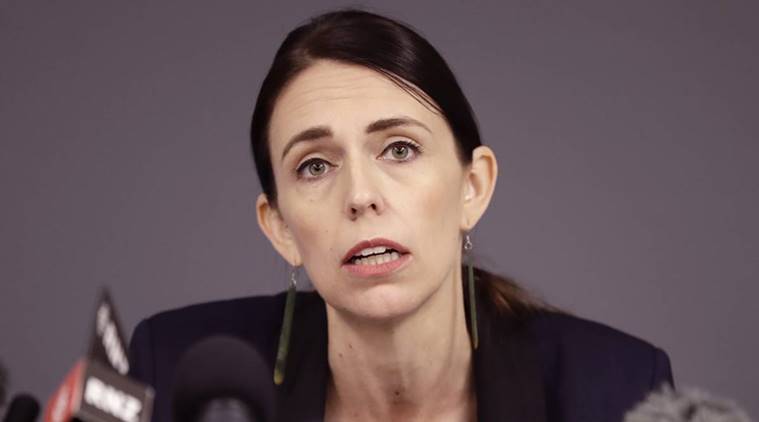 New Zealand Prime Minister Jacinda Ardern is seeking a second term in the office. (AP Photo/Mark Baker, File)
New Zealand Prime Minister Jacinda Ardern is seeking a second term in the office. (AP Photo/Mark Baker, File)
Ardern’s Labour Party, governing in a coalition with the Greens and the nationalist New Zealand First party, faces the conservative National Party in what has been a pandemic-dominated campaign.
Also Read | Jacinda Ardern admits having used cannabis. New Zealanders shrug: ‘Us, too’
Africa
Hotel Rwanda ‘hero’ denied bail
A court in the Rwandan capital, Kigali, has denied bail to Paul Rusesabagina, the subject of the Oscar-nominated film ‘Hotel Rwanda’ who saved 1,200 Tutsi and moderate Hutu by hiding them in his hotel during the 1994 genocide. The court ordered that Rusesabagina remains in custody and stands trial for 13 charges, including terrorism.
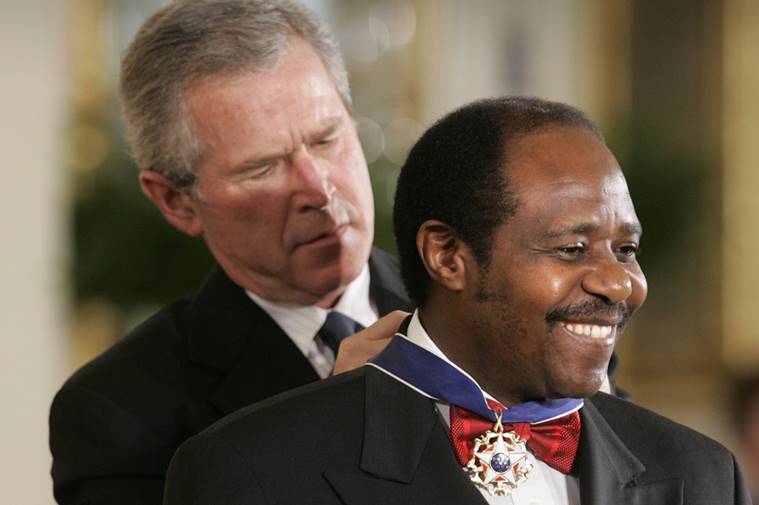 In this Nov. 9, 2005 file photo, President Bush awards Paul Rusesabagina the Presidential Medal of Freedom Award in the East Room of the White House, in Washington. (AP/PTI Photo)
In this Nov. 9, 2005 file photo, President Bush awards Paul Rusesabagina the Presidential Medal of Freedom Award in the East Room of the White House, in Washington. (AP/PTI Photo)
Mali’s transitional president appointed former minister of foreign affairs, Moctar Ouane, on Sunday as the West African nation’s prime minister.
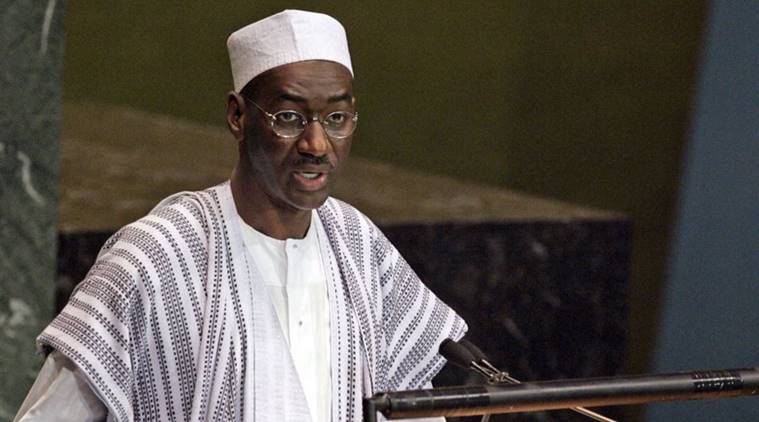 In this Thursday, Sept. 21, 2006 file photo, Mali’s then Minister for Foreign Affairs and International Cooperation Moctar Ouane addresses the 61st session of the United Nations General Assembly at the United Nations headquarters. (AP)
In this Thursday, Sept. 21, 2006 file photo, Mali’s then Minister for Foreign Affairs and International Cooperation Moctar Ouane addresses the 61st session of the United Nations General Assembly at the United Nations headquarters. (AP)
The appointment of a civilian prime minister was a major condition imposed by the West African regional economic bloc, ECOWAS, on Mali to lift sanctions that were imposed after an Aug. 18 coup.
On October 3, Sudan’s transitional authorities and a rebel alliance signed a peace deal initialed in August that aims to put an end to the country’s decades-long civil wars, AP reported
Sudanese civilian leaders hope the deal will allow them to revive the country’s battered economy by slashing military spending, which takes up much of the national budget.
Also Read | South Africa reopens to international flights amid virus
More from World News:
Leaders to UN: If coronavirus doesn’t kill us, climate change will
World’s first patient cured of HIV dies after cancer returns
‘It belongs to us!’: Tense French trial over colonial art
Global Covid-19 deaths hit one million, doubles in just three months
WHO, partners roll out faster Covid tests for poorer nations
Novartis CEO: It’ll take more than vaccine to fight Covid-19

For all the latest World News, download Indian Express App.
© IE Online Media Services Pvt Ltd
[ad_2]
Source link